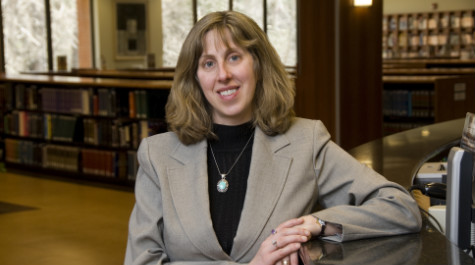Professor Nancy Combs Receives Cabell Professorship for 2009-2010
William & Mary Law School announced that Professor Nancy Combs has been selected as the William H. Cabell Research Professor for the 2009-2010 academic year. The grant will help Combs continue her groundbreaking work in international criminal law.
The Cabell Foundation, established by Robert G. and Maude Morgan Cabell III of Richmond, Virginia, established an endowment at the Law School in 1993 to further the research and scholarship of a faculty member each year. The Foundation has recently announced that it will provide matching funds for a challenge grant of up to $250,000 to supplement the endowment, ultimately allowing the Law School to award two Cabell Professorships per year.
Combs said she was delighted to receive the grant. "I'm very grateful for the Cabell Professorship as it has enabled me to spend the summer adding a final chapter to my new book."
Combs holds a Ph.D. in International Law from Leiden University, a J.D. from the University of California at Berkeley, a B.A. from the University of Portland, and a certificate from The Hague Academy of International Law.
Prior to joining the William & Mary faculty in 2004, she clerked for Justice Anthony Kennedy on the United States Supreme Court and worked as legal advisor at the Iran-United States Claims Tribunal in The Hague. She is the author of two books, Guilty Pleas in International Criminal Law: Constructing a Restorative Justice Approach (Stanford University Press, 2007) and Fact-Finding Without Facts: The Uncertain Evidentiary Foundations of International Criminal Convictions (Cambridge University Press, forthcoming 2010).
In addition, Combs has written numerous articles on international criminal law. She is an expert in the procedure of international criminal tribunals, such as the International Criminal Court, the International Criminal Tribunal for Rwanda, and the Extraordinary Chambers in the Courts of Cambodia. These tribunals have prosecuted Slobodan Milosevic, Charles Taylor and leaders of the Khmer Rouge.
Combs has lectured widely on the tribunal model and its efficacy for establishing "justice" in the wake of war crimes. Her research explores ways in which procedural mechanisms can be crafted to advance the goals of international criminal justice.
"Professor Combs' cutting-edge work on truth-telling in international criminal trials suggests that these trials fall short of their intended goal and suggests how international criminal law can be improved," said Professor Mark Drumbl of Washington & Lee School of Law. "In this regard, her contribution to the field is catalytic."
"Nancy's work on international criminal law is, in a word, bold," noted her colleague Professor Lan Cao. "Her conclusions are founded on original, primary research and she offers them, however controversial, with unflinching integrity."
